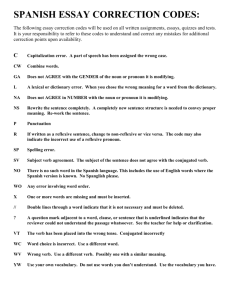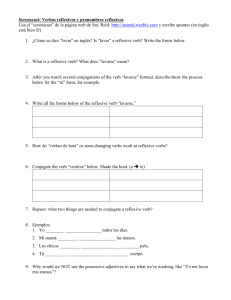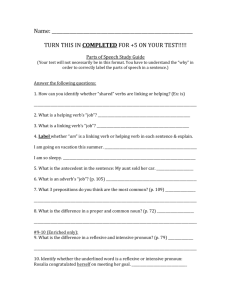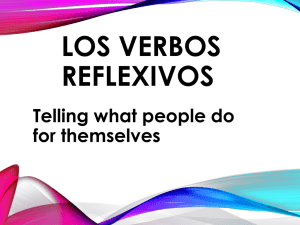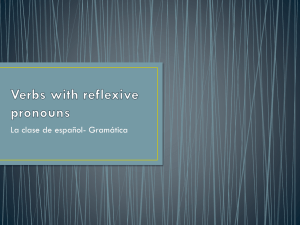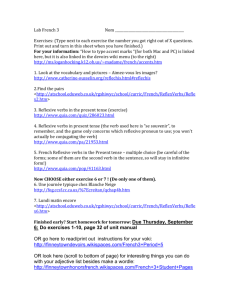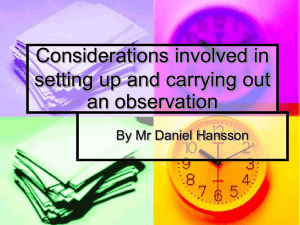Los verbos reflexivos
advertisement
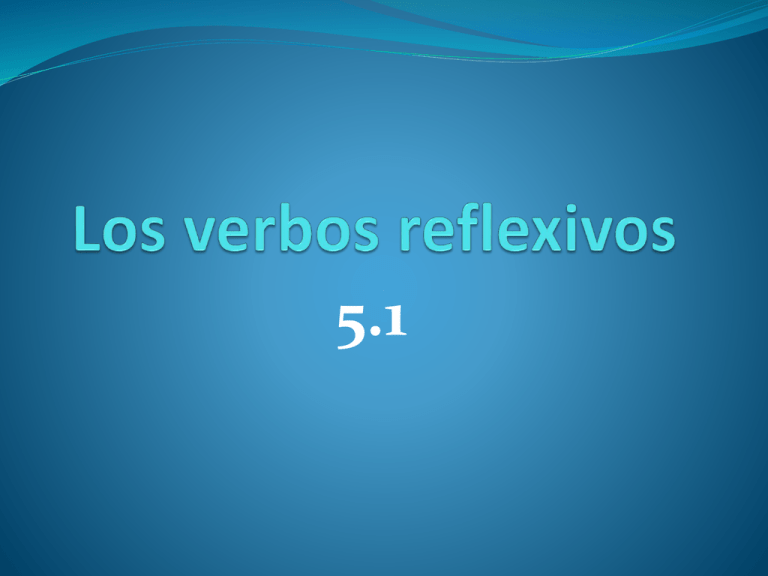
5.1 What are reflexive verbs? We use reflexive verbs to talk about actions we do to and for ourselves. For example: Brushing one’s teeth Washing one’s hair Putting on one’s makeup Getting dressed Fixing your hair Would it still be reflexive if…? You were brushing your dog’s teeth? You were washing the dishes? You were putting makeup on your friend? You were dressing your Barbie? You were fixing the car? Answer: NO! Which piece of the verb is reflexive? Reflexive verbs have 2 pieces: The first is the infinitive part of the verb which, when we conjugate it, tells us who is doing the action. The second is the reflexive pronoun which tells us who is receiving the action of the verb. Take a look: Lavarse The “se” on the end is the reflexive pronoun. In addition to conjugating the verb, we have to change the pronoun. For example: Let’s continue to work with lavarse If I want to say that I wash my face, I would say: Me lavo la cara. Would this be reflexive? Yes! If I want to say that I wash the car, I would say: Lavo el coche. Would this be reflexive? NO! So, what are the reflexive pronouns? Here ya go! Me Nos Te Os Se Se To conjugate a reflexive verb Take two steps forward and then two steps back Step 1 –decide the subject Step 2 – conjugate the verb for that subject Step 3 (back step)- choose the appropriate reflexive pronoun Step 4 (back step)-place the reflexive pronoun It’s a dance! Let’s try one… Translate this: Pepita showers every morning. Remember the steps? Step 1 –decide the subject Pepita Step 2 – conjugate the verb for that subject ducha Step 3 (back step)- choose the appropriate reflexive pronoun se Step 4 (back step)-place the reflexive pronoun Pepita se ducha cada mañana Let’s dance! (“Put on your red shoes and dance the blues”) Mi hermano ______________ los zapatos. (ponerse) Yo no ___________ de verde. No me gusta. (vestirse) Mi padre siempre ________ por la mañana. (afeitarse) Mis amigas __________ por la mañana. (maquillarse) Tú __________ un suéter cuando hace frío. (ponerse) Nosotras ______________ el pelo. (secarse) ¿A qué hora Uds.______________? (despertarse) Bea _____________ muy tarde cada noche. (dormirse) Vosotros _________ muy tarde en España. (acostarse) Let’s dance! (“Put on your red shoes and dance the blues”) Mi hermano se pone los zapatos. (ponerse) Yo no me visto de verde. No me gusta. (vestirse) Mi padre siempre se afeita por la mañana. (afeitarse) Mis amigas se maquillan por la mañana. (maquillarse) Tú te pones un suéter cuando hace frío. (ponerse) Nosotras nos secamos el pelo. (secarse) ¿A qué hora Uds. se despiertan? (despertarse) Bea se duerme muy tarde cada noche. (dormirse) Vosotros os acostáis muy tarde en España. (acostarse) In a two verb construction You have 2, count them 2, options in a two-verb construction sentence. ① You may attach the reflexive pronoun to the end of the infinitive – Yo voy a bañarme ahora. OR ② You may put the reflexive pronoun in front of the conjugated verb – Yo me voy a bañar ahora. Whether you choose option 1 or option 2, be sure that your reflexive pronoun matches the verb #1 – the conjugated verb. Let’s practice the two step! Make sentences using the following elements in two- verb construction. 1. Yo/querer/cepillarse el pelo 2. Ellos/no/ir a/bañarse hoy 3. Tú/poder/lavarse la cabeza 4. Mi hermano/pensar/vestirse de pirata mañana 5. Los estudiantes/no/querer/levantarse 6. Nosotras/preferir/maquillarse lentamente 7. Ud./no/necesitar/pintarse las uñas 1. 2. 3. 4. 5. 6. 7. Yo quiero cepillarme el pelo. or Yo me quiero cepillar el pelo. Ellos no van a bañarse hoy. or Ellos no se van a bañar hoy. Tú puedes lavarte la cabeza. or Tú te puedes lavar la cabeza. Mi hermano piensa vestirse de pirata mañana. or Mi hermano se piensa vestir de pirata mañana. Los estudiantes no quieren levantarse. or Los estudiantes no se quieren levantar. Nosotras preferimos maquillarnos lentamente. or Nosotras nos preferimos maquillar lentamente. Ud. no necesita pintarse las uñas. Or Ud. no se necesita pintar las uñas.
